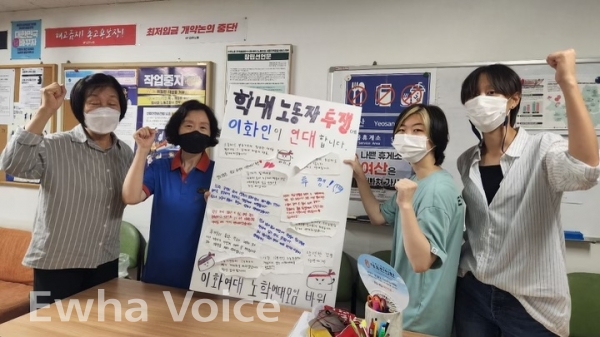
In early August, campus workers and subcontractors reached an agreement about five months after a long struggle that began in March. The campus workers’ wages were increased by 400 won, but it is quite far from the goals workers have been fighting for. Still, there is more room for improvement.
On March 28, an in-school labor union composed of cleaning, security, and facility workers began a protest calling for the improvement of campus workers’ working environment, such as the guarantee of a living wage, installation of shower facilities, and renovation of lounges. The objective was to ensure that subcontractors contracted with the school would improve working conditions.
Currently, each building has contracts with different subcontractors, and workers initially consented to stop the protest if even one agreement was reached. Thus, on June 20, when a subcontractor stamped an agreement document with security workers, the campus workers suspended the protest.
However, after that, there has been no consensus among subcontractors on the need for cleaning workers. The agreement was delayed as the subcontractors changed their words. Instead of increasing wages by 440 won, they tried to compromise with workers by raising wages by 400 won and adjusting the number of annual paid holidays.
The fight was not easy. The union’s picketing protest, which was held in front of the Main Hall once a day on weekdays at first, grew into a twice-daily event in front of the president’s office at the Main Hall in anger at the school for not listening to workers’ demands.
Behind these united campus workers were supportive backups. One such group was Laborock, an organization of Ewha students who strive to improve the rights of workers facing discrimination and oppression in the unequal Korean labor market structure. Laborock participated in the protest almost every day and made speeches. To unite with more students, they conducted a signature campaign demanding answers from the school, which gathered 342 signatures from students, and requested other organizations to join the protest.
The issue regarding the treatment of campus workers is nothing new. In fact, around July 2021, when it was time to sign a contract with a service company, Laborock held a picketing protest with campus workers and hosted an on- site radio broadcast with the in-school labor union to unite with students.
“Contracts or wage-related agreements with service companies are held every year,” explained Park Seo-rim, the representative of Laborock. “Since the problem cannot be solved only by protesting for one period, Laborock is continuously working together to improve campus workers’ rights.”
According to Park, the problem lies in the subcontracting system in which the school, the original contractor, easily avoids responsibility, while subcontractors have no practical authority. They shift the blame back and forth regarding workers’ rights issues as all campus workers are temporary hires arranged by the subcontractors.
Park added that the workers’ lounge issue has still not been addressed even though a bill was implemented on Aug. 18 mandating the construction of a workers’ lounge. She expressed her hope that the school will use its authority as the original contractor because subcontractors will have no choice but to change if the school shows a willingness to make improvements.
Park said the members of Laborock are always grateful for the struggles of campus workers, and, moreover, want to convey the solidarity from students with them. She explained that she has never thought that students were not interested in the problems of the campus workers’ working environment because not only Ewha Voice but also many other organizations such as school newspapers, journals, and the press have contacted her.
According to Park, the campus workers were concerned that students would be disturbed if they held a protest during the exam period. However, she was sure that none of the Ewha students would have been bothered by the sound. She believed everyone would be hoping that the problem would be solved soon. Thus, whenever Park made a speech at the protest, she tried to convey a feeling of unity.
“Real change can be achieved by the interest and solidarity of us–the students,” Park said.
“There may be only a few students who actively fight for the workers’ rights, but I believe that gathering more students’ fellowship, and the power of solidarity resulting from it will actually bring victory for the workers.”
Park thanked the Ewha students as well, commenting that she felt grateful to the students who came to the protest, participated in the signature campaign, and expressed support for the online community.
“I love our school, feel proud to attend Ewha, and believe that there are many advantages that only our school has,” Park said. “However, I want Ewha to be truly prestigious. I hope our school listens more to the voice of campus workers and takes an active role, not passive and evasive. Just like our slogan ‘Where Change Begins,’ I hope Ewha begins to make the change in campus workers’ rights.”

